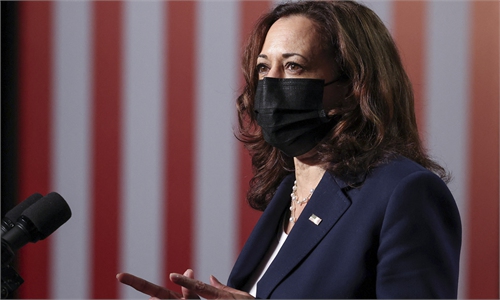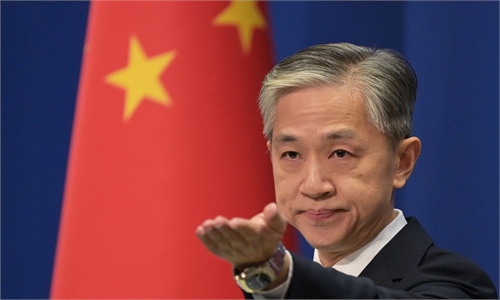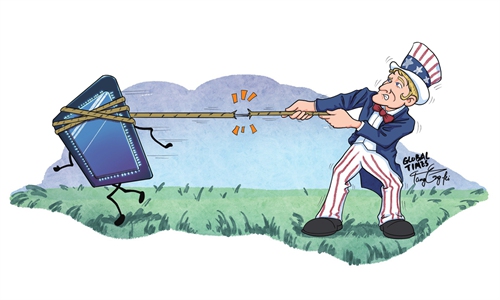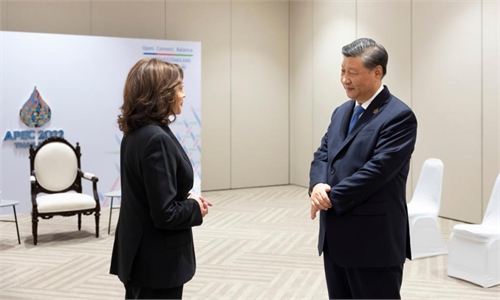Harris’ Philippines visit aims to fan conflicts surrounding South China Sea and Taiwan Straits
Deliberate peddling of ‘China threat’ loathed by Southeast Asian countries
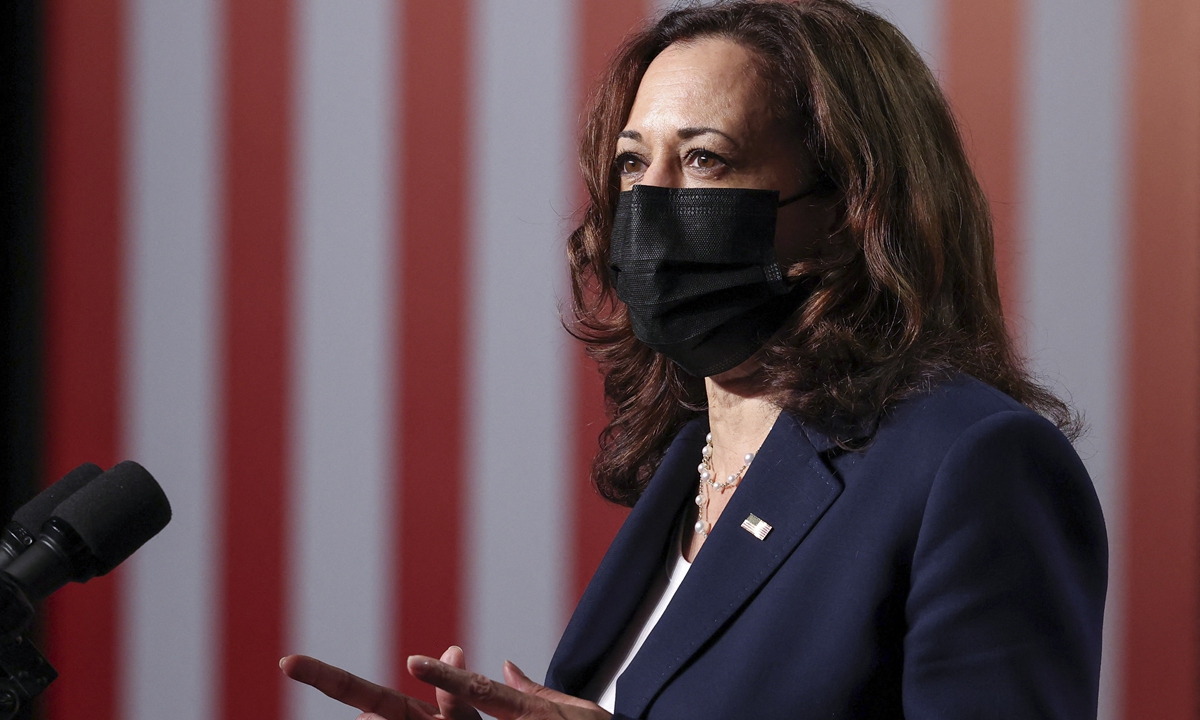
US Vice President Kamala Harris. Photo:AFP
Pursuing an agenda of fanning conflicts surrounding the South China Sea and Taiwan questions and containing China, US Vice President Kamala Harris was in the Philippines for a three-day visit after attending the APEC meeting in Thailand and met with President Ferdinand Marcos Jr on Monday, becoming the highest-ranking American official to visit the country since Marcos took power in June.But for officials in Manila and other countries in Southeast Asia, who loathe being caught in a big power rivalry, the US peddling of the "China threat" in the region will make them realize who is the real saboteur of regional security and stability, and alienate them further from the US.
Harris' visit is seen by Chinese observers as a glimpse into US policy on China after the leaders of the two countries met in Indonesia last week. They believed that while the leaders' meeting ushered in a "remission" of conflict, Harris' visit, along with US politicians' recent remarks, serves as a reminder that Washington's antagonism and hostility toward China remain unchanged. They believed the next two years will be a "window of opportunity" for both if they can translate positive signs into momentum of pushing forward bilateral ties, before relations are thrown into uncertainty again when the next US presidential election comes.
During her meeting with Marcos on Monday, Harris said the US has an "unwavering" commitment to the Philippines.
"We stand with you in defense of international rules and norms as it relates to the South China Sea," Harris told Marcos at the start of talks in the presidential palace in Manila, the Straits Times reported. "An attack on the Philippine armed forces, public vessels or aircraft in the South China Sea would invoke the US mutual defense commitment... That is our unwavering commitment to the Philippines," Harris said, according to the report.
Harris is the highest-ranking American official to visit the Philippines since Marcos took power in June. She also met with her Philippine counterpart, Sara Duterte, daughter of the former president Rodrigo Duterte.
On Tuesday, she will fly to Palawan province, which lies along the South China Sea, to meet fishermen, villagers, officials and the coast guard. Palawan province is also home to the Antonio Bautista Air Base in Puerto Princesa, the center of the Philippine military command. She will be the highest-ranking US leader to visit the frontier island at the forefront of the disputed waters, media reported.
When asked about Harris' trip to the Philippines and to the military base, Mao Ning, spokesperson of China's Ministry of Foreign Affairs, said, "We don't oppose US interaction with regional countries. But such interaction should promote regional peace and stability, not damage other countries' interests."
Harris' visit aims to reinforce Washington's Indo-Pacific strategy, and demonstrate US support for the Philippines and other Southeast Asian allies, said Chinese experts. "Although China has not publicly been mentioned during her visit yet, the US vice president seeks to fan disputes surrounding the South China Sea in this region, and remind its allies that they will not be safe without support from Washington," Li Haidong, a professor from the Institute of International Relations at the China Foreign Affairs University, told the Global Times.
At his meeting with Marcos on November 17 in Bangkok, Thailand, Chinese President Xi Jinping said that on the South China Sea, the two sides must stick to friendly consultation and handle differences and disputes properly.
Jose Manuel Romualdez, the Philippine ambassador to the US, pointed to another meaning behind the US vice president's visit by disclosing to Reuters that Marcos and Harris in their meeting "will touch on the Taiwan situation," adding that the Philippines wants to play a role in peaceful co-existence between the US and China.
The Philippines is geographically crucial for Washington's military interference in the Taiwan question, which is why the US is sparing no effort in courting the Philippines into cooperating on this issue, Zhu Feng, a professor of international relations at Nanjing University, told the Global Times on Monday.
Despite being an ally of the US, the Philippines is shying away from becoming involved in the Taiwan question and from publicly supporting the US moves on this issue, said Zhu, describing it as Manila's effort to seek balance between Beijing and Washington.
In addition to the Philippines, conflicts over the Taiwan question have gripped many Southeast Asian countries. Joko Widodo, president of Indonesia, which just hosted G20, told the Economist that he was "very worried" about the possibility of a conflict over Taiwan, not least because it could destroy the region's hopes for development and prosperity.
Relations between China and the US have been strained after US House Speaker Nancy Pelosi's provocative visit to Taiwan island in August. According to the Economist, many Southeast Asian strategists also deplored the visit, calling it "needlessly provocative."
The more the US tries to push conflicts between Southeast Asian countries with China over the South China Sea issue and Taiwan question, the clearer it will be to those countries that the US is the real saboteur of regional stability, said Li. Sadly, the Biden administration seems blind to the fact that those countries desperately want to steer away from conflicts; if it pushes harder, those countries will distance themselves from the US, Li said.
Window of opportunity
Harris made the visit to the Philippines with the aim of countering China right after Xi met with his US counterpart, Joe Biden in Indonesia last week, where the two had a candid and in-depth exchange of views on issues of strategic importance in China-US relations and on major global and regional issues.
The talk ushered in a positive trend of resuming multiple channels of communication between the two countries in areas such as trade and climate.
Xi also had a brief exchange with Harris at the latter's request on the sidelines of the APEC Economic Leaders' Meeting on Saturday in Thailand, during which Xi said it is hoped that China and the US will further increase mutual understanding, reduce misperception and miscalculation, and work together to bring bilateral relations back on the track of healthy and steady development. It is hoped that Harris would play a positive role in this regard, Xi said.
When asked if the defense ministers from China and the US would hold talks on the sidelines of the ASEAN Defense Ministers' Meeting-Plus (ADMM-Plus) held in Cambodia, Senior Colonel Tan Kefei, spokesperson for the Chinese Ministry of National Defense, said on Sunday, "The Chinese side holds a positive and open attitude toward having exchanges with the US side during the ADMM-Plus."
Tan said the relevant departments of the two sides "are maintaining communication and coordination" in this regard.
The two leaders' meeting has certainly reinforced guardrails of bilateral relations, preventing it from going astray, said experts, while referring to Harris' visit, as well as certain US politicians' sabre-rattling over the "China threat" as signs that Washington's antagonism toward Beijing remains unchanged.
On Saturday, US Defense Secretary Lloyd Austin fired another round of criticism against China. When warning that Russia's conflict with Ukraine offers a preview of a world where nuclear-armed countries could threaten other nations, he said Beijing, like Moscow, seeks a world where "might makes right."
Kevin McCarthy, the Republican leader in the US House of Representatives, said on Sunday he would form a select committee on China if he is elected speaker of the chamber, accusing the Biden administration of not standing up to Beijing.
"China is the No. 1 country when it comes to intellectual property theft," he told Fox News in an interview.
Experts said that as conflicts between the two countries may ease during the short period of "remission" after the leaders' meeting, it also entered a "window of opportunity."
"The Biden administration is likely to tweak its China policy in the upcoming period, although its hostility and competing with China remain. Then, China-US relations will again be thrown into uncertainty as the US embraces another round of elections in two years. Therefore, the next two years are crucial to see if the two countries can translate the positive signs on the table into a momentum to push forward bilateral ties," said Li.
